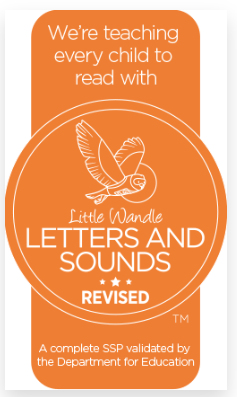Phonics
Our phonics teaching in school is systematic, sequential, consistent, directly taught daily in short bursts with pace and rigor. As a result our children do very well in statutory phonics screening tests and in becoming established readers. Phonics opens up the potential of reading and so much other learning too and we know that we have to get our phonics teaching right for our children as early as possible. Our phonics teaching has been a strength in school for some time and we have a clear sequence in our teaching with clear expectation of the phonics order to teach over time and what a phonics should look like with all staff trained in phonics delivery and practice being frequently monitored. We have been above national with our phonics screening results for some time.
We use the Little Wandle phonics scheme which is matched with Little Wandle reading books to ensure 100% cosistency in our phonics teaching. We offer children additional phonics sessions when required and cath up programs if children are struggling to keep up. Our children achieve well in phonics here at Pinewood.
This is how we write our sounds

The video links below show how we teach the children how to say our sounds:
If you could not attend our phonics training for parents you can find relevant information below:
Statutory phonics screening check
At the end of year one, your child will undergo a statutory phonics screening check. This is a statutory assessment which began in 2012.
All children in year one must take the check and any year two children who did not meet the expected standard in the previous year will take the check again.
The phonics screening check is designed to confirm whether or not individual children have learned phonics decoding to the appropriate standard.
Our children do very well in phonics and over the years have often scored higher than the national average.
The links below will enable you to download copies of previous phonics screening checks.
Our phonics workshop materials provide further details about the check.
These are our recent results compared to National and Nottinghamshire Local Authority:
Phonics is taught from Nursery and is divided into different phases or sets, with each phase building on the skills and knowledge of previous learning.The first aim is to foster children’s speaking and listening skills as preparation for learning to read with phonics. Parents can play a vital role in helping their children develop these skills, by encouraging their children to listen carefully and talk extensively about what they hear, see and do.
